The Qantas Sale Act amendments are set to pass the Senate this week, following a deal the government made with Labor which has consistently opposed majority foreign ownership of the “Australian” airline. For Qantas, little has changed.
Qantas has been bound by both the Air Navigation Act, 1920, and the Qantas Sale Act, 1992. The Air Navigation Act requires Australian airlines to have 51% local ownership to fly into and out of Australia. The Qantas Sale Act places more specific restrictions on foreign ownership. These restrictions have now been eased to allow a maximum of 49% foreign ownership in Qantas by a single foreign investor or airline.
Qantas may now be able to gain access to increased equity finance and this would help with funding changes required to increase the profitability of the company.
But things are still not looking good for Qantas with analysts forecasting a pre-tax full year loss of more than $700 million for the airline, on the back of a $235 million reported loss for the six months to December 2013.
Its competitor, Virgin, while bound by the Air Navigation Act, is not affected by the Qantas Sale Act, and has been able to get around the 49% restrictions set out in the Air Navigation Act through careful management of its equity structure.
Virgin has also found the going tough with a loss of A$83.7 million reported for the six months to December 2013, and some analysts forecasting a full financial year pre-tax loss of $241 million.
It is interesting to look at the change in share prices of the two companies over the longer term.

The chart above shows the outcome of an investment of A$1.00 in both Qantas and Virgin at the end of December 2003 and how this investment panned out over the period through to now. While your investment in the largest 200 Australian stocks is looking good, neither of the airlines has performed particularly well. Virgin has basically flat lined over the period from 2009 to the present and Qantas’s value has fallen over this period.

The chart above provides a similar picture for the period from January 2 through to July 15, 2014. This shows that an investment in Qantas has performed a little better than the market with the airline earning a little more than Virgin over the period. In short, while Qantas is complaining about restrictions, both Qantas and Virgin are facing difficult times.
The returns for Qantas and Virgin are fairly highly correlated as might be expected in a competitive market such as aviation.
While reading share price movements is fraught it is interesting to see the recent increase in share price of Qantas over the last couple of days. The Qantas share price has lifted 5% since news of the deal emerged, suggesting shareholders were not so unhappy with the change introduced into Parliament. On the other hand Virgin saw its share price fall by 1.2% over the same period.
There seems little good reason to retain the present restrictions on Qantas, particularly given the competition that exists between Qantas and Virgin. Rather than ask why Qantas should be allowed to take on more foreign ownership, perhaps we should be asking why there is any restriction at all. Virgin provides a good example of how the model could work if the Qantas Sale Act were repealed.
Given increased flexibility in ownership it is likely that Qantas will be looking for strategic investors to help with its restructure. Yet, it seems unlikely that Qantas will be selling off assets for now. Qantas identifies its long-term competitive advantage in terms of customer experience and the Qantas domestic dual-brand. Further, the recent losses earned by Jetstar would make it difficult to offload.

